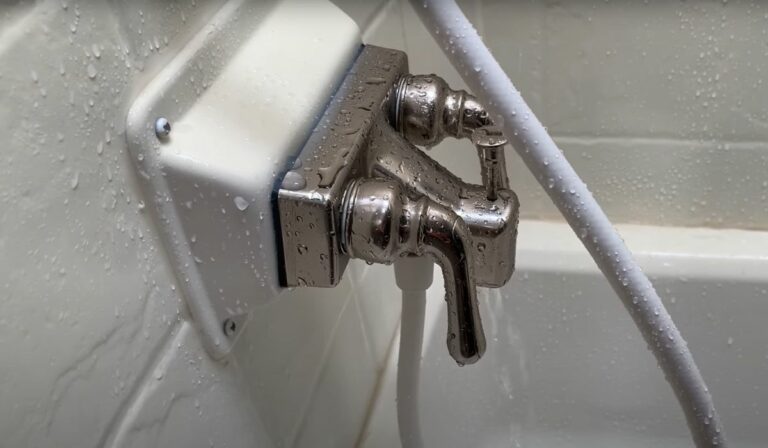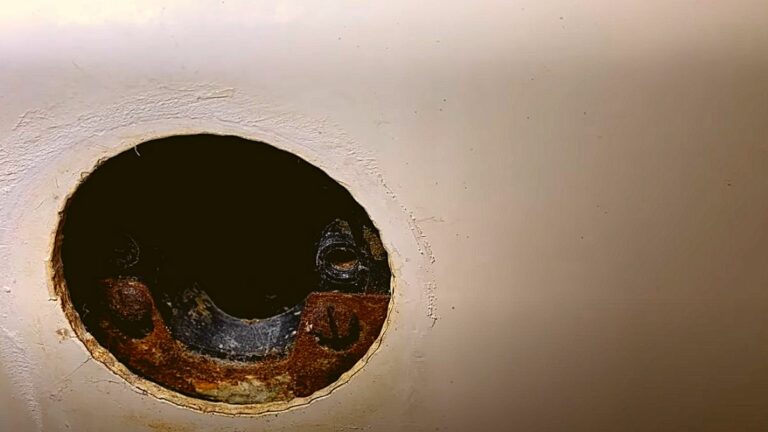What Is a Shower Sting
A shower sting happens when your skin feels burning, itching, or prickling during or after showering. It’s often caused by hot water, harsh soaps, or minerals in hard water that strip your skin’s natural oils and irritate sensitive areas. If you have dry or damaged skin, the sting can be worse. You can ease it by adjusting water temperature and choosing gentle products. Keep following to uncover how to prevent and soothe that uncomfortable sting.
Causes of Shower Sting
Although shower sting can catch you off guard, it usually happens because your skin’s protective barrier is compromised. When your skin loses its natural oils or becomes dry, water and soap can irritate it more easily.
Hard water, which contains minerals like calcium and magnesium, often worsens this by leaving residue that dries your skin further. Hot water strips away even more oils, making your skin vulnerable.
Harsh soaps and body washes with strong fragrances or chemicals can also break down your skin’s defenses. If you’ve recently shaved or have minor cuts, your skin is more sensitive and prone to stinging.
Understanding these causes helps you adjust your shower routine to protect your skin and prevent that uncomfortable sting.
Common Symptoms Experienced
When you experience a shower sting, you’ll often notice a sharp, burning sensation on your skin that can range from mild to intense. This discomfort usually appears immediately or shortly after the water touches your skin.
You might also feel itching or tingling in the affected area. Sometimes, the skin looks red or flushed, signaling irritation.
In some cases, you could notice small bumps or a rash developing, especially if your skin is sensitive or dry.
The sting often lasts only a few minutes but can persist longer if your skin barrier is compromised.
You may find certain areas, like your arms or legs, are more prone to these symptoms.
Recognizing these common signs helps you understand when your skin is reacting to the shower.
How Water Temperature Affects Skin Sensitivity
The sharp, burning sensation you feel during a shower sting often ties directly to the temperature of the water. When the water is too hot, it can strip away your skin’s natural oils, leaving it dry and more vulnerable to irritation. Your skin’s nerve endings become more sensitive, making even brief contact with hot water feel painful or uncomfortable.
On the other hand, cold water usually causes less irritation, but sudden temperature changes might still trigger a stinging sensation if your skin is already compromised. To protect your skin and reduce sensitivity, try using lukewarm water during showers. This helps maintain your skin’s natural barrier and prevents the sharp sting that often comes from extreme temperatures.
Adjusting water temperature is a simple way to avoid discomfort.
The Role of Soap and Shower Products
How do soap and shower products affect the sting you feel during a shower? The ingredients in your soap can either soothe or irritate your skin. If you use soaps with harsh chemicals, fragrances, or high pH levels, they can strip your skin’s natural oils, leaving it dry and sensitive.
This dryness makes your skin more prone to that stinging sensation. On the other hand, gentle, moisturizing cleansers help maintain your skin’s protective barrier, reducing irritation.
You’ll want to avoid products with alcohol or sulfates, as they often worsen the sting. Choosing soap labeled for sensitive skin or one with natural ingredients can make a big difference.
Impact of Hard Water on Skin Irritation
Besides the type of soap you use, the quality of water can play a big role in skin irritation during a shower. Hard water contains high levels of minerals like calcium and magnesium, which don’t rinse off easily. When you shower with hard water, these minerals can leave a residue on your skin, clogging pores and stripping natural oils.
This often leads to dryness, itchiness, and that uncomfortable stinging sensation. You might notice your skin feeling tight or looking flaky after a shower. If you’re sensitive or have already irritated skin, hard water can make stinging worse.
Using a water softener or gentle, moisturizing cleansers can help reduce irritation caused by hard water and make your shower experience more comfortable.
Skin Conditions That Increase Shower Sting Risk
If you have certain skin conditions, you might notice shower sting more often or intensely. Conditions like eczema, psoriasis, and dermatitis weaken your skin’s protective barrier, making it more sensitive to water temperature and soap ingredients.
When your skin is inflamed or cracked, even lukewarm water can cause discomfort or a burning sensation. You might also find that your skin reacts strongly to the chemicals in soaps or shampoos, triggering stinging during or after your shower.
If you suffer from dry skin, the lack of natural oils can leave your skin vulnerable to irritation as well. Understanding how these conditions affect your skin can help you recognize why shower sting happens more frequently and feel more intense, even without changes in your shower routine.
Tips for Preventing Shower Sting
Although shower sting can be frustrating, you can take simple steps to reduce or prevent it. First, adjust your water temperature to lukewarm rather than hot, as hot water can irritate your skin. Use gentle, fragrance-free soaps and cleansers to avoid further irritation.
Moisturize your skin immediately after showering to lock in hydration and protect your skin barrier. Avoid scrubbing too hard with washcloths or loofahs, which can damage sensitive skin.
If you know your skin is prone to dryness or conditions like eczema, try shorter showers and avoid harsh water pressure. Finally, ensure your bathroom is well-ventilated to prevent humidity buildup, which can worsen irritation.
Following these tips can help you enjoy your showers without the sting.
When to Seek Medical Advice
While mild shower sting often resolves on its own, you should seek medical advice when the irritation persists, worsens, or is accompanied by other symptoms like severe redness, swelling, or pain.
If you notice blistering, oozing, or signs of infection, don’t ignore them. Also, if you develop a fever, chills, or feel generally unwell, it’s important to get checked.
People with sensitive skin, allergies, or underlying skin conditions should be especially cautious and consult a healthcare provider if symptoms arise.
Delaying treatment could lead to complications, so trust your instincts. If you’re unsure whether your reaction is normal, err on the side of caution and reach out to a medical professional for guidance and proper care.
Home Remedies to Soothe Shower Sting
A few simple home remedies can help soothe the discomfort caused by a shower sting. First, rinse the affected area with cool water to remove any irritants and reduce burning.
Applying a cold compress or an ice pack wrapped in a cloth can calm inflammation and numb pain. You might also try aloe vera gel, which has soothing and healing properties.
Avoid using harsh soaps or scrubbing the area, as this can worsen irritation. Over-the-counter hydrocortisone cream or calamine lotion can reduce itching and redness.
Drinking plenty of water helps keep your skin hydrated, promoting faster recovery. If you notice any worsening symptoms, stop home treatment and consult a healthcare professional.
These remedies can ease discomfort and support your skin’s natural healing process after a shower sting.
Long-Term Skin Care After Shower Sting
Proper long-term skin care after a shower sting involves consistent moisturizing, gentle cleansing, and protecting your skin from further irritation.
Start by using a fragrance-free, hypoallergenic moisturizer daily to restore your skin’s barrier. Choose mild, soap-free cleansers to avoid stripping natural oils.
Avoid hot water during showers, as it can worsen sensitivity; opt for lukewarm instead.
Protect your skin from harsh chemicals and excessive sun exposure by applying a broad-spectrum sunscreen when going outside.
If you notice persistent redness or peeling, consider using products with soothing ingredients like aloe vera or ceramides.
Finally, stay hydrated and maintain a balanced diet rich in vitamins to support skin healing.
These steps will help you manage your skin’s recovery and prevent future discomfort.
Frequently Asked Questions
Can Shower Sting Be a Sign of Allergy to Water?
Yes, shower sting can be a sign of water allergy, known as aquagenic urticaria. If you notice itching or stinging after contact with water, you should consult a doctor for diagnosis and proper treatment options.
Does Shower Sting Affect All Skin Types Equally?
No, shower sting doesn’t affect all skin types equally. If you have sensitive or dry skin, you’re more likely to feel discomfort. Your skin’s barrier plays a big role, so take care with water temperature and products.
Are Electric Showers More Likely to Cause Stinging?
Electric showers can sometimes cause more stinging because their water temperature fluctuates quickly, irritating sensitive skin. You’ll want to adjust settings carefully and test water temperature before jumping in to avoid discomfort.
Can Diet Influence Shower Sting Sensitivity?
Yes, your diet can influence shower sting sensitivity. Eating spicy or acidic foods may increase skin irritation, while a balanced diet rich in vitamins supports skin health and reduces sensitivity. So, watch what you eat!
Is Shower Sting Common in Children and Infants?
Yes, shower stings can be common in children and infants because their skin is more sensitive. You should use gentle, fragrance-free soaps and lukewarm water to help prevent irritation and discomfort during bath time.
Conclusion
If you’ve experienced a shower sting, you’re not alone. Knowing what causes it—from water temperature to harsh soaps—helps you prevent discomfort. Pay attention to how your skin reacts and adjust your routine accordingly. Use gentle products, avoid very hot water, and consider a water softener if needed. If stinging persists or worsens, don’t hesitate to see a doctor. With the right care, you can enjoy your showers without irritation or pain.


